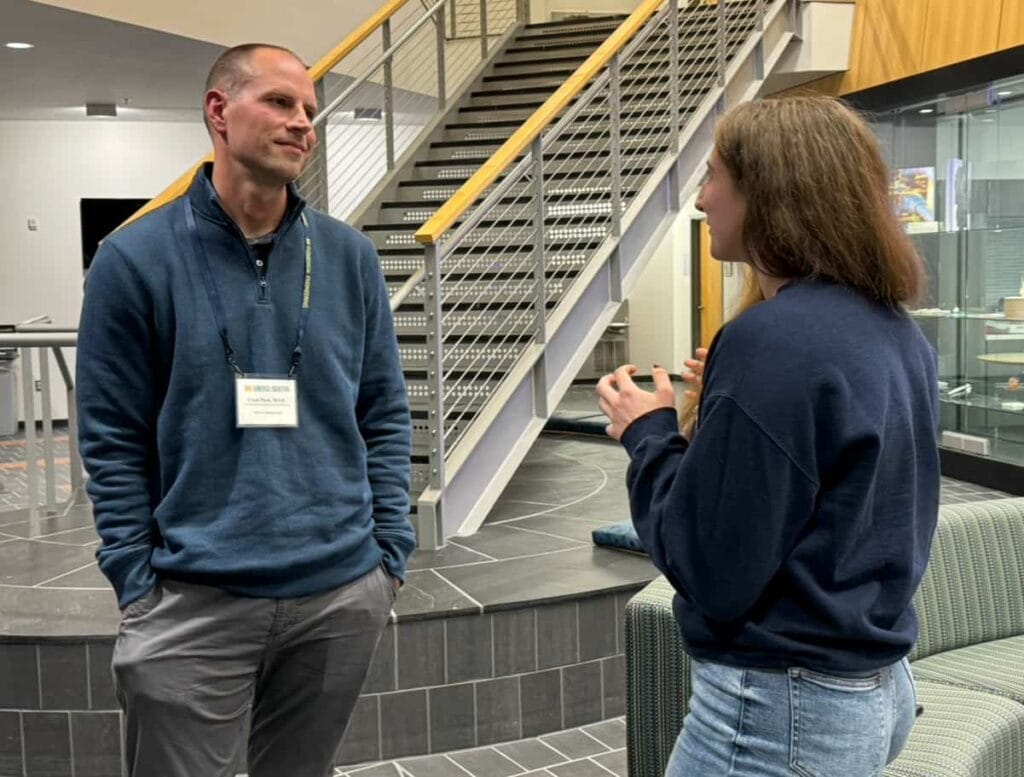Industry Relations
Ways to Get Involved
Biomedical Engineering at the University of Michigan works closely with industry and business to help improve products and techniques and build relationships with future BME graduates who will be tomorrow’s leaders in biomedical engineering. Activities include:
- Information sessions
- BMES events
- Department networking events
- Design Programs
- Wallace H. Coulter Translational Research Partnership Program: Offers faculty and students the support and guidance to move innovation rapidly from the lab to the clinic.
- Design Program: A sequence of undergraduate and graduate classes that allow students to work closely on sponsored projects helping real companies solve real problems.
- Start-ups: Launched by faculty members based on ideas researched at Michigan.

Make a Difference Through Your Time
Guest lecturers and presenters provide professional expertise to BME students as they explore research and career opportunities.
Partner With BME’s Design Program
The Design Program gives clinicians and industry professionals a chance to partner with talented, motivated BME design students and train their collective focus on a particular problem. Our Design Program partners not only ask to participate again, they also refer their colleagues because our students consistently generate high-caliber ideas that:
- Improve upon existing technologies
- Lead to novel solutions
- Win design awards
- Form the basis for journal articles
- Secure provisional patents
Working in the medical device, pharmaceutical or biotech industry? Create a pipeline that will keep talented interns and co-op students flowing to your company. We welcome companies that want to build relationships with BME students through:
Client/sponsor
Act as client for Engineering 100 or BME 450/499 students:
- Provide financial support for project materials
- Present problem and possible solutions
- Be available to students throughout course
Donors
- Provide in-kind donations of equipment, tools, or materials
- Contribute to the Biomedical Engineering Student Design Courses Fund
- Support fabrication costs for student prototypes
Lecturers
- Clinical lecture and brainstorming session for BME 599. If topic is chosen by students, serve as clinical mentor/resource during second semester
- Guest lecture and suggested readings on specialized engineering or business topic for Engineering 100, BME 450/499, or BME 599
Presentation reviewer
- Attend BME 450/499 and 599 team presentations, offer feedback and questions
Technical expert
- Serve as technical resource on particular topic as needed
Interested in getting involved?
A Note on Intellectual Property: A testament to the innovative, well-developed output of BME design students is that intellectual property is an important consideration for these classes. In general, students’ stake in a project’s IP increases as course demands increase. Individual course materials spell out IP arrangements and options, but the guiding principle is that IP is owned by the individuals who contribute to the design – typically the students and the client if they makes an inventive contribution to the design. In most cases, U-M owns the IP developed by U-M faculty.
Our Graduates Are a Special Brand Of Engineer
Michigan BME pairs a great ABET accredited engineering education with experiences that also prepare our students to thrive in a medical setting.
- Laboratory research and instrumentation
- Design process
- Teamwork
- Technical communication
- Entrepreneurship
- Legal and regulatory issues
Specialized Skills
- Biomedical Engineers are trained as engineers to solve problems in rigorous, quantitative ways
- Core courses: CAD & Modeling, Statistics, Data Analysis, Computer Programming, Quantitative Cell Biology, & Physiology
- Elective courses: Biofluids, Biosolids, AI/ML, Entrepreneurship, and more
- Focus on experiential learning
- Courses with labs in Circuits, Biomechanics, Bioinstrumentation, and Thermodynamics
- Capstone design course with focus on medical device design
- Multidisciplinary by nature and excel at tackling clinical problems in cross-functional teams including engineers, clinicians, and others
- At the graduate level receive advanced training in Medical Product Development, including project management, human factors engineering, NPD processes, quality and risk, telehealth, and cybersecurity
Passion
- BME students are proven strong learners with a passion to improve human health care
- Comfortable in clinical settings and can see the broader picture of healthcare technology
- BME is strong in gender equity, and we promote diversity, equity, and inclusion
Impact
- Demonstrated commitment to improving health through engineering & technology
- Invested in what they design and build, and the impact it will have on patients
- Leadership in co-curricular groups dedicated to solving problems in world health and improving lives globally
Find your Future Faculty at Michigan
Michigan Biomedical Engineering produces exceptional PhDs and Postdocs who are prepared for faculty positions.
Explore the College of Engineering Academic PhD site to discover your next Professor. Our candidates offer diverse areas of expertise and are actively pursuing an academic career in the coming year.
If you would like to get involved or have questions, contact:

Karen Gates
Alumni, Industry, and Development Manager
(734) 615-9412